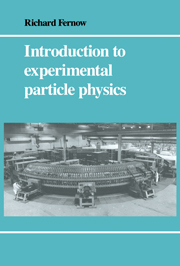Book contents
- Frontmatter
- Contents
- Preface
- 1 Introduction
- 2 Electromagnetic interactions
- 3 Nuclear interactions
- 4 Particle beams
- 5 Targets
- 6 Fast electronics
- 7 Scintillation counters
- 8 Cerenkov counters
- 9 Proportional chambers
- 10 Drift chambers
- 11 Sampling calorimeters
- 12 Specialized detectors
- 13 Triggers
- 14 Detector systems
- 15 Some fundamental measurements
- Appendix A Physical constants
- Appendix B Periodic table of the elements
- Appendix C Probability and statistics
- Appendix D Cross sections and probability
- Appendix E Two-body scattering in the LAB frame
- Appendix F Motion of ions in a combined electric and magnetic field
- Appendix G Properties of structural materials
- Author index
- Subject index
5 - Targets
- Frontmatter
- Contents
- Preface
- 1 Introduction
- 2 Electromagnetic interactions
- 3 Nuclear interactions
- 4 Particle beams
- 5 Targets
- 6 Fast electronics
- 7 Scintillation counters
- 8 Cerenkov counters
- 9 Proportional chambers
- 10 Drift chambers
- 11 Sampling calorimeters
- 12 Specialized detectors
- 13 Triggers
- 14 Detector systems
- 15 Some fundamental measurements
- Appendix A Physical constants
- Appendix B Periodic table of the elements
- Appendix C Probability and statistics
- Appendix D Cross sections and probability
- Appendix E Two-body scattering in the LAB frame
- Appendix F Motion of ions in a combined electric and magnetic field
- Appendix G Properties of structural materials
- Author index
- Subject index
Summary
In this chapter we will briefly review the various types of targets used in particle physics experiments. The target normally consists of a piece of metal or liquid hydrogen. However, a number of other types of targets are sometimes used in specialized applications. These include polarized targets for spin dependent measurements, gas jets, active targets, and beam dumps.
Standard targets
Most particle physics experiments at fixed target accelerators use either a thin metal target or a cryogenic target containing liquid hydrogen or deuterium. The choice of target is dictated by considerations of the required signal rate, associated background, and necessary resolution. The finite target size and absorption, energy degradation, and multiple scattering in the target can all affect the measurement resolution.
The chief advantages of metal targets are the high interaction rate and the convenience of preparation. Solid targets such as beryllium are widely used in experiments studying muon production. A disadvantage is the amount of multiple scattering and absorption suffered by particles produced in the block. This can have a deleterious effect on experiments studying the effective mass of produced hadrons. The extraction of nucleon cross sections from scattering data with a nuclear target usually involves some sort of model-dependent or background target subtraction.
Liquid hydrogen targets offer the best resolution for the study of hadronic resonances. The multiple scattering and nuclear absorption are small.
Information
- Type
- Chapter
- Information
- Introduction to Experimental Particle Physics , pp. 125 - 132Publisher: Cambridge University PressPrint publication year: 1986
